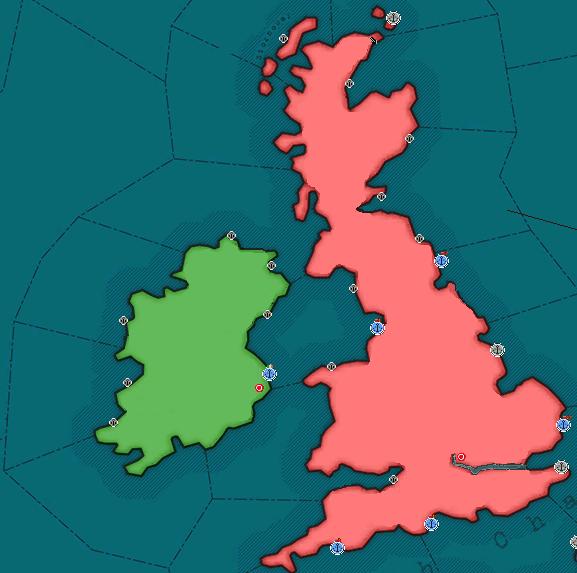Union of Britain
From Kaiserreich
Union Of Britain is a Socialist state in West Europe.
(Need much more text)
Politics
The Union of Britain is a "decentralised" state ruled by directly elected regional councils under the jurisdiction of a national "Congress of Trade Unions" (CTU). The chairman of the CTU is the nominal head of state, but the government is generally seen by British citizens as a collective entity - decisions are made by voting for a simple majority and all Unions are committed to respecting the majority ruling. Representatives are elected to the TUC
Major industrial concerns are nationalised and run by their respective Trade Unions with supervision from the Congress, but certain economic freedoms are afforded to local businesses such as pubs, bakeries, groceries, distribution and co-operative farms. Having seen the difficulties apparent in France's attempts at 100% nationalisation and collectivisation, the current British ethos is not one of an entirely state directed economy - instead the CTU prefers to allow low levels of economic freedom backed up by strong workers' rights, welfare support and a democratisation of the workplace in the form of co-operatives (both the Private and Public company are banned as forms of business organisation).
History
After the defeat of France the United Kingdom’s war with Germany dragged on inconclusively for two years. In 1921 the stalemate was finally broken when Lloyd-George agreed to General Ludendorf's proposal for a "Peace with Honour". Under the terms of this treaty it was agreed that Britain would acknowledge Germany's gains from the war, whilst Germany would respect the Imperial possessions of the remaining Entente powers of Britain, Japan and Portugal. However, while Britain's overseas territories remained largely ordered and intact, the faith and support of the people in the Home Islands did not. In 1925, disaster struck: a minor labour dispute in the coalfields of South Wales quickly escalated after troops were sent in to restore order. Following the French example a General Strike was called by the TUC, and when the ‘government of national security’ sent orders for military action to quell the unrest many troops deserted to the side of the strikers, which was accompanied by a major naval mutiny. After six weeks of rioting, looting and pamphleteering on a massive scale the Royal Family were evacuated to Canada, followed by most of the country's leading politicians and large property owners. Following the ejection of the ‘Establishment’ a provisional government of revolutionary groups dissolved both Houses of Parliament, and declared that political authority in the new ‘Union of Britain’ would pass to a new Congress of Trade Unions. The British people are currently secure on their island, content to build socialism in political and economic isolation, protected by the strong Republican Air Force and Navy, and with each county protected by its own popular militia who act both as a reserve military and the new police constabularies.

